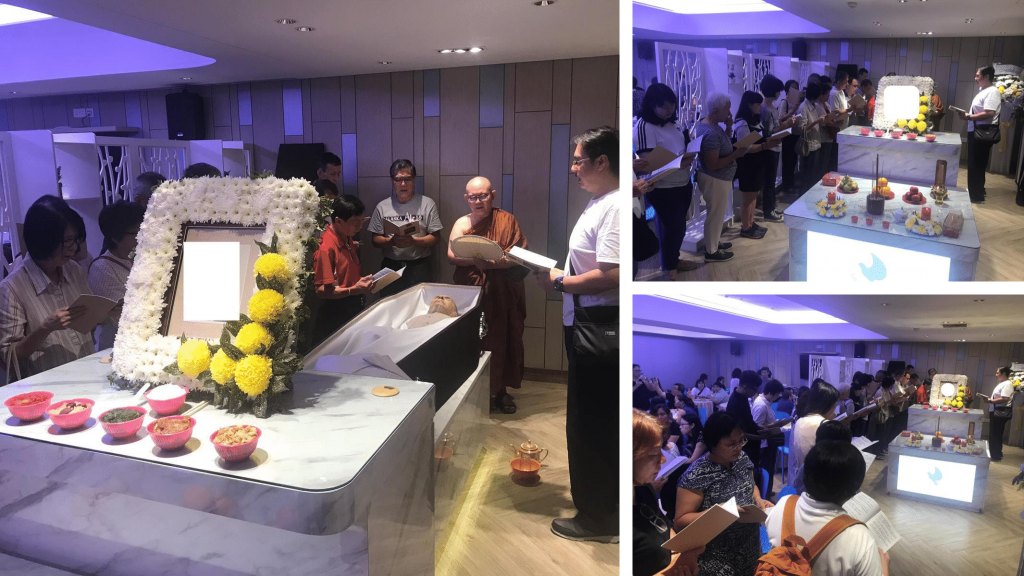- Usually, when one of our members experiences the loss of a family member, they often reach out to our esteemed Bhantes, the Buddhist monks, to request their presence at the funeral or wake in order to conduct chanting sessions. This ritual serves as a means of offering spiritual solace and guidance during these times of grief and mourning. However, it is not only our Bhantes who attend these sessions; our devoted followers and meditation students also join in, actively participating in the chanting and engaging in the practice of manasarati, which involves the contemplation of death.
- The book of manasarati chanting holds a significant place during these occasions as it comprises the profound teachings of the Buddha on impermanence and the contemplation of the 32 parts of the body. By focusing on the impermanence of life and the constant flux of our physical being, individuals are encouraged to embrace the transient nature of existence and develop a deeper understanding of the ephemeral nature of all things.
- The formal and serene atmosphere during these chanting sessions allows individuals to enter a state of introspection and self-reflection. They are reminded of the importance of living a mindful and virtuous life, while also acknowledging the inherent uncertainty of life and the inevitability of death. This contemplative practice serves as a reminder to cherish and appreciate the present moment, fostering a sense of gratitude and compassion towards oneself and others.
- In conclusion, the inclusion of manasarati chanting during funerals or wakes is a deeply valued aspect of our spiritual tradition. Through the teachings of impermanence and contemplation of the body’s transient nature, individuals are provided with an opportunity to find solace, cultivate mindfulness, and develop a profound appreciation for the preciousness of life.

What is Manarasati ?
Manarasati, also known as contemplation on death, is a profound and introspective practice that has its origins in Eastern philosophical and spiritual traditions. Rooted in the understanding that death is an inevitable and universal reality, Manarasati encourages individuals to reflect upon the transient nature of life and the impermanence of human existence.
The purpose of Manarasati is to foster a deeper appreciation for the preciousness of life and to cultivate a sense of urgency in using one’s time wisely. By contemplating the inevitability of death, one is compelled to examine the priorities and values guiding their actions and choices. This contemplation serves as a powerful reminder that life is finite and that every moment should be cherished and utilized in the pursuit of higher ideals and personal growth.
Furthermore, Manarasati raises awareness of the impermanence of material possessions and worldly attachments. It encourages individuals to detach themselves from materialistic pursuits and instead focus on nurturing virtuous qualities and spiritual development. By recognizing the transitory nature of existence, Manarasati prompts individuals to seek inner fulfillment and meaning, rather than placing undue importance on external validation or accumulating material wealth.
While contemplation on death may initially evoke feelings of unease or discomfort, its ultimate aim is to empower individuals to live fully and authentically. By embracing the reality of death, one becomes more aware of the preciousness of each passing moment. This awareness brings about a transformative shift in perspective, leading to a more intentional and purposeful way of living.
In essence, Manarasati offers a profound invitation for individuals to confront their mortality and contemplate the deeper dimensions of life. By acknowledging the inevitability of death and embracing this contemplation, one embarks on a journey towards self-discovery, spiritual growth, and a more meaningful existence.
Benefits of Manarasati:
- The chanting of sutta, such as manasarati, during funerals or wakes, can provide several benefits to the members coping with the loss of their family members. Here are a few ways it can help:
- 1. Emotional release: Chanting screates a meditative and calm environment, allowing individuals to connect with their emotions and process their grief. It provides a safe and supportive space for them to express and release their feelings, which can be cathartic and help them cope with the loss.
- 2. Promotion of mindfulness: Chanting, which helps individuals focus their minds on the present moment. This practice of mindfulness allows them to temporarily detach from their sorrow and anxiety, providing some relief from the overwhelming emotions associated with the loss.
- 3. Spiritual comfort: Many suttas contain sacred verses or references to deities. Chanting these suttas during funerals or wakes can provide a sense of spiritual comfort and connection. It can remind individuals that their loved ones have moved on to a better place and are at peace, offering solace during a challenging time.
- 4. Unity and support: Chanting as a group during a funeral or wake can create a sense of unity and support among the mourners. It helps foster a feeling of shared experience and a collective grieving process. Coming together in this way can provide comfort by knowing that others are going through the same emotions and that they are not alone in their loss.
- 5. Transcendence of grief: The repetitive nature of chanting can help individuals move beyond their grief and sorrow. By focusing on positive vibrations and the act of chanting itself, individuals may experience a sense of transcendence, temporarily lifting them above their pain and allowing them to glimpse a deeper meaning or purpose in life.
- It’s important to note that the effectiveness of chanting in coping with loss may vary for each individual. Different people find solace in different ways, and personal beliefs and cultural backgrounds also play a significant role in how they process grief.





